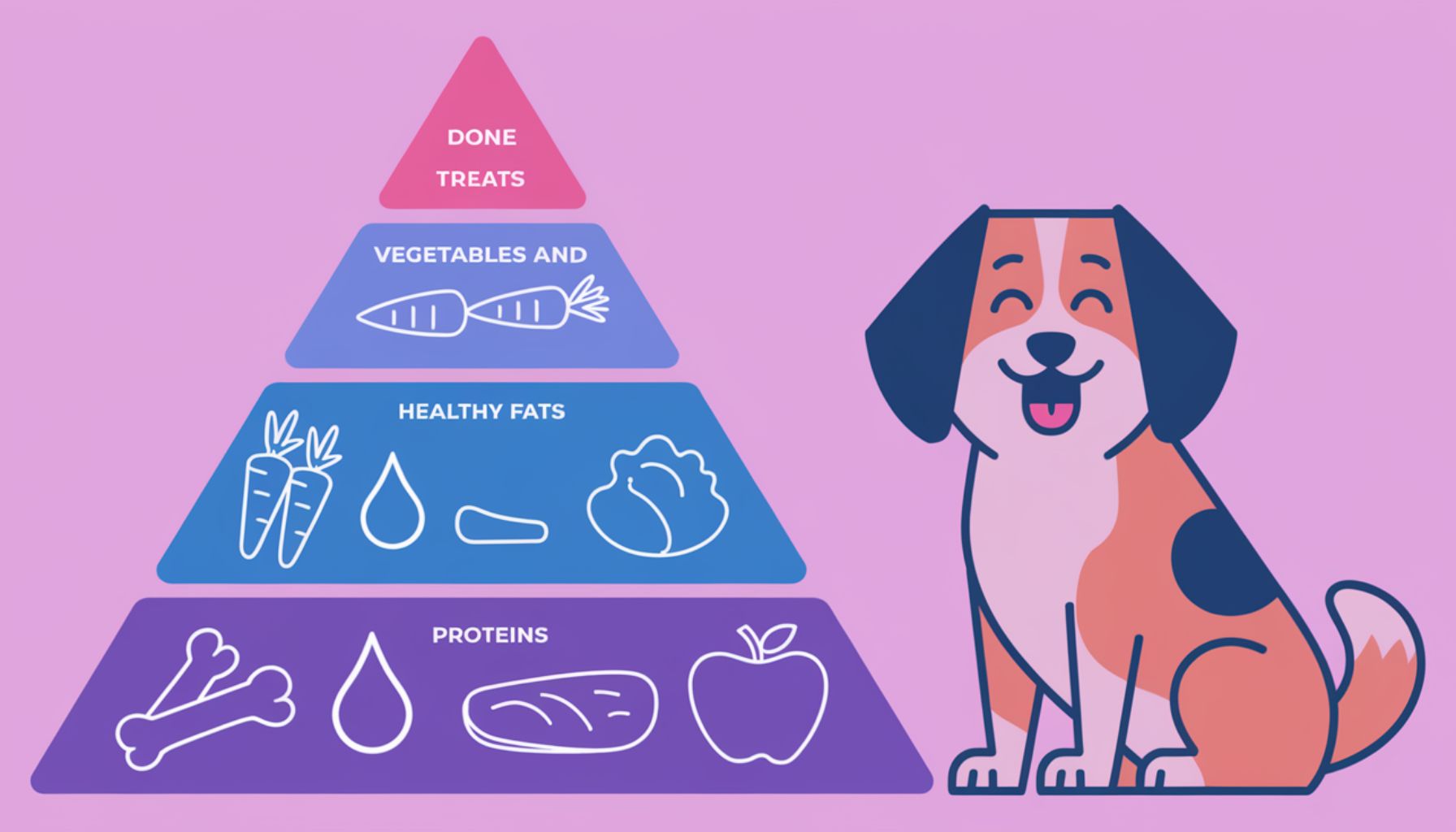Optimal Canine Nutrition: Fueling Your Dog’s Health
Some of our posts on woofwagnation.com contain affiliate links. If you click on an affiliate link and make a purchase, we may receive a commission. Clicking on an affiliate link that earns a commission does NOT result in additional charges or costs you extra. Earnings from affiliate links help keep this website running. See our full affiliate disclosure here.
Have you ever wondered if your furry friend’s diet is truly meeting their nutritional needs?
Dog nutrition and diet play a crucial role in your canine companion’s overall health and vitality.
Just as humans thrive on a balanced diet, our four-legged friends require carefully tailored nutrition to support their active lifestyles, maintain robust immune systems, and promote longevity. Whether you’re a seasoned pet parent or new to the world of dog ownership, understanding the intricacies of canine nutrition can significantly impact your dog’s quality of life.
From protein-packed meals to essential fatty acids, every element of your dog’s diet contributes to their well-being.
By diving into the world of optimal dog nutrition, you’ll discover how to make informed choices that can lead to a happier, healthier, and more energetic pup.
Let’s explore the key components of a nutritious canine diet and how you can ensure your beloved pet is getting the best possible nourishment.
The Evolution of Dog Nutrition
16,000 – 30,000 Years Ago
Dogs are first domesticated and primarily fed scraps from human meals.
2000 BCE
Roman writings evidence consideration of specialized dog diets.
Mid-1800s
The Industrial Revolution leads to the emergence of commercial dog food.
1860
James Spratt introduces the first commercially-prepared pet food in England.
1922
The first canned dog food appears on the market.
Early 1960s
Puppy-specific food is developed, reflecting growing understanding of canine nutritional needs.
Mid-1980s
U.S. National Academy of Sciences publishes official nutritional requirements for dogs and cats.
2006
Nutritional requirements for dogs and cats are updated.
Recent Years
Trends towards diverse and specialized dog food options, including raw diets, alternative protein sources, and sustainability-focused products.
Key Takeaways
- Balanced Diet: A mix of proteins, fats, carbohydrates, vitamins, and minerals is essential for optimal canine health.
- Life Stage Nutrition: Dietary needs vary significantly from puppyhood to senior years.
- Quality Matters: High-quality ingredients in appropriate proportions support overall health and vitality.
- Hydration: Water is a critical yet often overlooked component of a dog’s diet.
- Individual Needs: Each dog’s nutritional requirements can vary based on breed, size, activity level, and health status.
- Consistent Monitoring: Regular assessment of your dog’s diet with veterinary guidance ensures ongoing nutritional adequacy.
- Proper Feeding Practices: Portion control and appropriate feeding schedules contribute to maintaining a healthy weight.
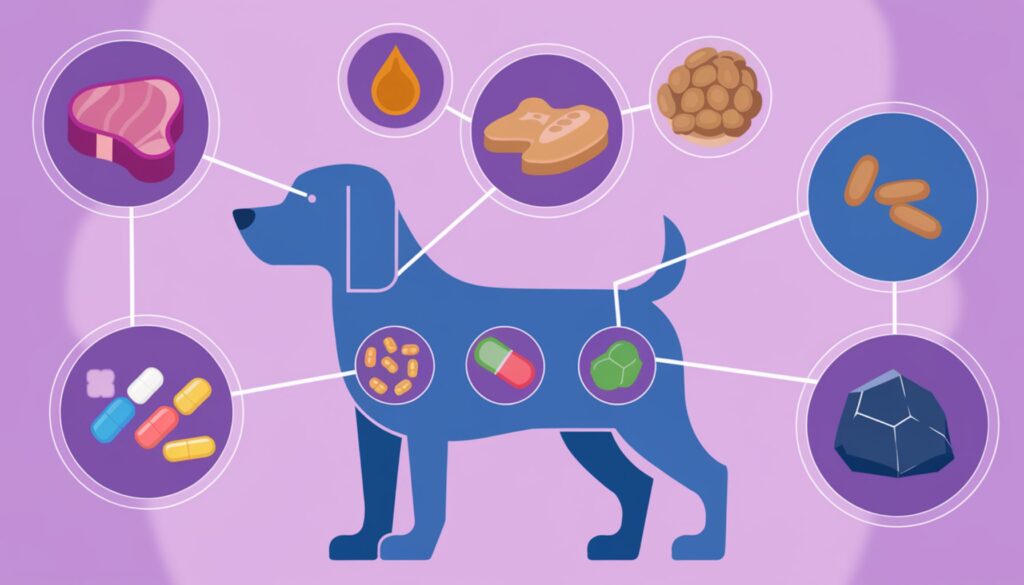
The Basics of Dog Nutrition
Understanding the fundamental components of canine nutrition is crucial for every dog owner. A well-balanced diet not only fuels your dog’s daily activities but also supports their long-term health. Let’s explore the key nutrients that should be present in your dog’s diet and why they’re so important.
Essential Nutrients for Dogs
Dogs require a combination of proteins, fats, carbohydrates, vitamins, and minerals to thrive. Each of these nutrients plays a vital role in maintaining your dog’s health, from supporting muscle growth to promoting a shiny coat.
Protein Requirements
Protein is the building block of your dog’s body, essential for muscle development, tissue repair, and immune function. High-quality animal proteins, such as chicken, beef, or fish, should form the foundation of your dog’s diet. These proteins contain all the essential amino acids that dogs need but can’t produce on their own.
Essential Components of Dog Nutrition
Protein
Essential for muscle development and repair. Aim for high-quality animal sources.
Fats
Provide energy and support skin health. Include sources of omega-3 and omega-6 fatty acids.
Carbohydrates
Offer energy and fiber. Choose complex carbs like sweet potatoes or brown rice.
Vitamins & Minerals
Support various bodily functions. Ensure a balanced intake through diet or supplements.
Importance of Fats
Fats are a concentrated source of energy for dogs and are crucial for the absorption of fat-soluble vitamins. They also contribute to skin health and coat shine. Omega-3 and omega-6 fatty acids, found in fish oils and certain plant oils, are particularly beneficial for reducing inflammation and supporting cognitive function.
Role of Carbohydrates
While dogs don’t have a strict requirement for carbohydrates, they can be a valuable source of energy and fiber. Complex carbohydrates from sources like sweet potatoes or brown rice can provide sustained energy and support digestive health. However, the carbohydrate content should be balanced with protein and fats to maintain optimal health.
Vitamins and Minerals
These micronutrients are essential for various bodily functions, from bone growth to blood clotting. Most high-quality commercial dog foods are formulated to meet these needs, but it’s important to ensure your dog’s diet includes a full spectrum of vitamins and minerals, either through food or supplements as recommended by your veterinarian.
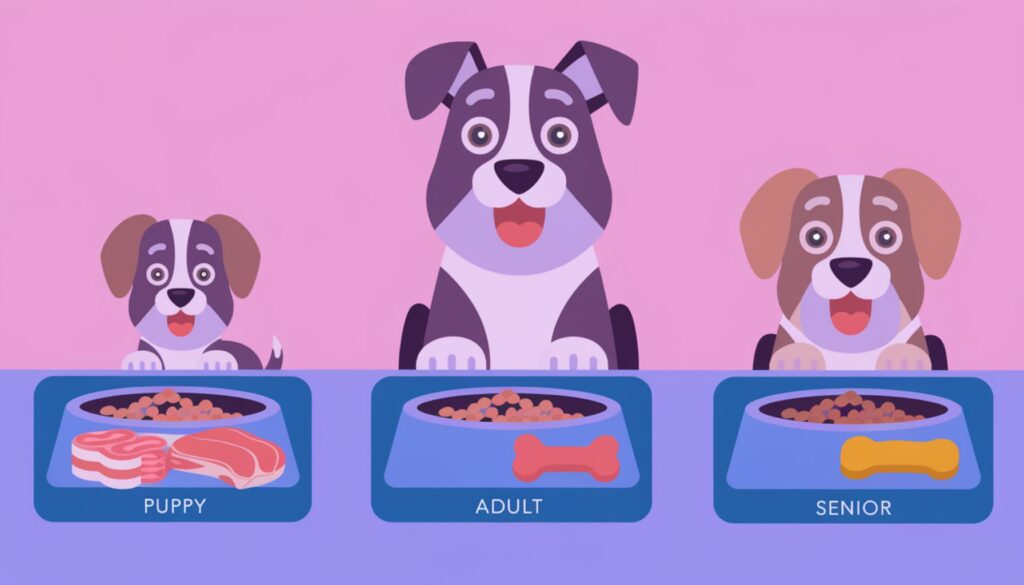
Tailoring Nutrition to Your Dog’s Life Stage
As dogs progress through different life stages, their nutritional needs evolve. Understanding these changes is key to providing the best possible diet for your canine companion at every age. Let’s explore how nutritional requirements shift from puppyhood to the senior years.
Puppy Nutrition
Puppies have high energy needs and require diets rich in protein to support rapid growth and development. Their food should contain a balance of calcium and phosphorus for proper bone formation. Smaller, more frequent meals are often recommended to support their fast metabolism and smaller stomachs.
Adult Dog Dietary Needs
Once dogs reach adulthood, their nutritional needs stabilize. Adult dogs require a balanced diet that maintains their weight and supports their activity level. The focus shifts from growth to maintenance, with protein levels adjusted to prevent excess weight gain while still supporting muscle mass.
Senior Dog Nutrition Considerations
As dogs enter their senior years, their metabolism slows, and they may become less active. Senior dog diets often have reduced calorie content to prevent obesity but may include increased fiber for digestive health. Joint-supporting nutrients like glucosamine and chondroitin are often added to senior formulas to promote mobility.
Common Dietary Concerns
Even with a well-planned diet, dogs can experience various nutritional challenges. Being aware of these common issues can help you address them promptly and ensure your dog maintains optimal health through proper nutrition.
Food Allergies and Sensitivities
Some dogs develop allergies or sensitivities to certain food ingredients, often proteins like beef or chicken. Symptoms can include skin irritations, digestive issues, or ear infections. If you suspect a food allergy, working with your veterinarian to conduct an elimination diet can help identify the problematic ingredient.
Weight Management
Obesity is a growing concern in dogs and can lead to various health issues, including joint problems and diabetes. Maintaining a healthy weight through proper portion control and regular exercise is crucial. If your dog needs to lose weight, your vet can help you develop a safe weight-loss plan that doesn’t compromise nutritional balance.
Special Dietary Needs for Health Conditions
Certain health conditions may require specific dietary adjustments. For instance, dogs with kidney disease might need a diet lower in phosphorus, while those with heart conditions might benefit from reduced sodium intake. Always consult with your veterinarian before making significant changes to your dog’s diet to address health concerns.
Choosing the Right Dog Food
Selecting the appropriate food for your dog can be overwhelming given the multitude of options available. Understanding the different types of dog food and their benefits can help you make an informed decision that best suits your dog’s needs and your lifestyle.
Commercial Dog Food Options
Commercial dog foods come in various forms, including dry kibble, wet food, and semi-moist options. High-quality commercial diets are formulated to meet the nutritional standards set by organizations like the Association of American Feed Control Officials (AAFCO). When choosing a commercial food, look for products that list a high-quality protein source as the first ingredient and avoid those with excessive fillers or artificial preservatives.
Homemade Diets
Some dog owners prefer to prepare homemade meals for their pets. While this allows for complete control over ingredients, it requires careful planning to ensure nutritional balance. If you’re considering a homemade diet, consult with a veterinary nutritionist to develop a plan that meets all of your dog’s nutritional needs.
Raw Feeding Considerations
Raw diets have gained popularity among some dog owners, but they remain controversial in the veterinary community. Proponents argue that raw diets more closely mimic a dog’s ancestral diet, while critics raise concerns about nutritional imbalances and potential bacterial contamination. If you’re interested in raw feeding, thorough research and consultation with a veterinarian are essential to ensure safety and nutritional adequacy.
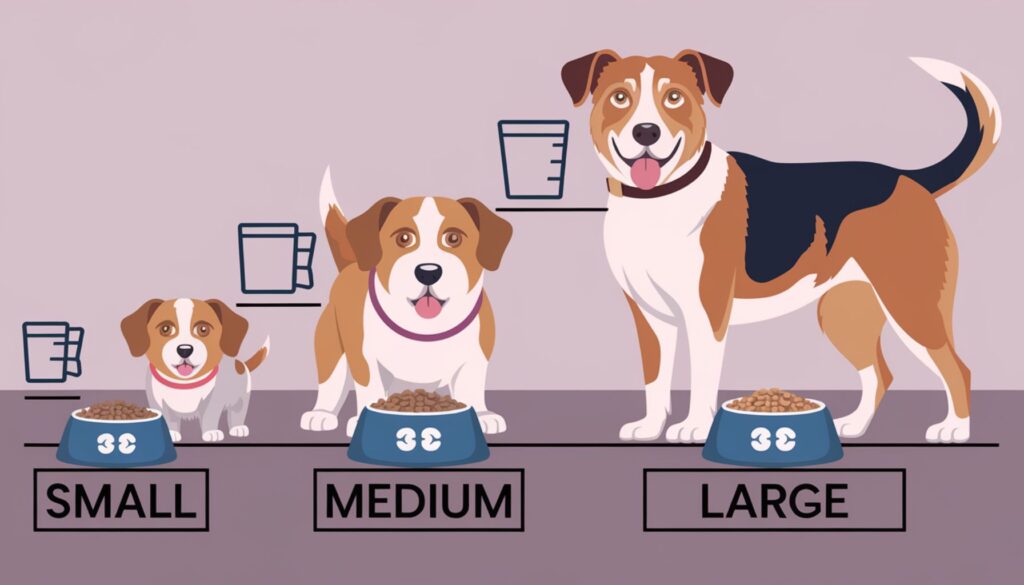
Feeding Practices and Schedules
Proper feeding practices are just as important as the food itself. Establishing good habits can help maintain your dog’s health and prevent issues like obesity or nutritional deficiencies.
Portion Control
Overfeeding is a common problem that can lead to obesity. Follow the feeding guidelines on your dog food package, but remember that these are general recommendations. Adjust portions based on your dog’s activity level, age, and body condition. Use measuring cups to ensure accuracy, and resist the urge to “eyeball” portions.
Feeding Frequency
Most adult dogs do well with two meals a day, while puppies may require three to four smaller meals. Consistency in feeding times can help regulate your dog’s digestive system and establish a routine. Some dogs may benefit from puzzle feeders or slow-feed bowls to prevent rapid eating and promote mental stimulation.
Treats and Snacks
While treats are excellent for training and bonding, they should make up no more than 10% of your dog’s daily caloric intake. Choose healthy, low-calorie treats, and consider using portions of your dog’s regular meal as rewards. Avoid human foods that can be harmful to dogs, such as chocolate, grapes, and onions.
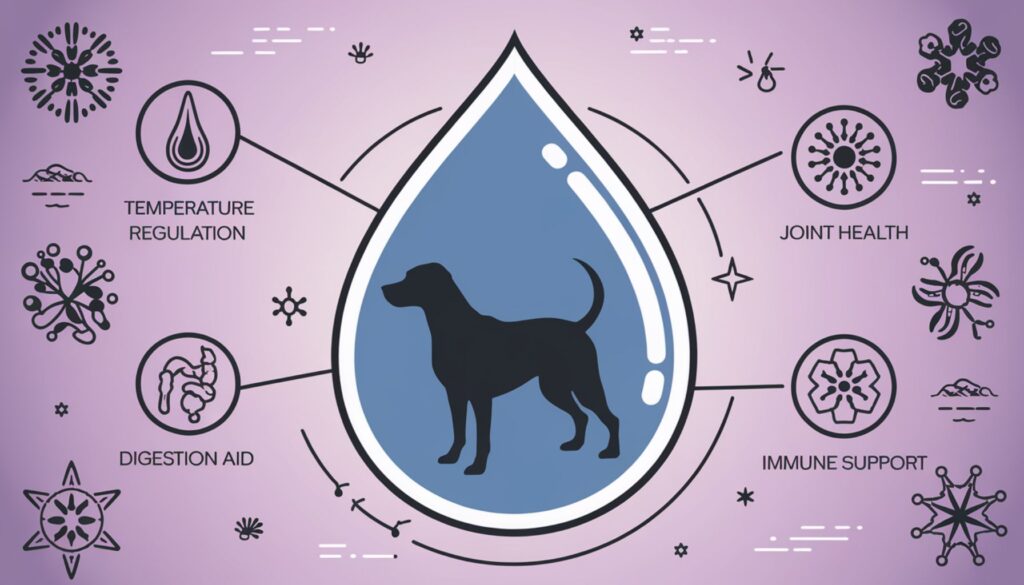
Hydration: An Often Overlooked Nutrient
Water is essential for life, yet its importance in canine nutrition is sometimes overlooked. Proper hydration is crucial for numerous bodily functions, including digestion, circulation, and temperature regulation.
Importance of Water in a Dog’s Diet
Water makes up about 60-70% of an adult dog’s body weight and is involved in nearly every physiological process. It helps transport nutrients, aids in digestion, cushions joints, and regulates body temperature. Dehydration can quickly become serious in dogs, leading to lethargy, loss of appetite, and in severe cases, organ failure.
Ensuring Proper Hydration
Always provide fresh, clean water for your dog. The amount of water a dog needs can vary based on factors like size, activity level, and diet. Dogs eating dry kibble typically need more water than those on wet food diets. Encourage drinking by placing multiple water bowls around your home, especially in warm weather or after exercise.
Product Recommendations
Choosing the right products can significantly enhance your dog’s nutritional health. Here are some top picks that align with optimal canine nutrition and diet:
- Hill’s Science Diet Adult Dry Dog Food: This balanced formula supports digestive health and is made with high-quality, easy-to-digest ingredients that align with a dog’s nutritional needs.
- Purina Pro Plan Focus Adult Sensitive Skin & Stomach: For dogs with dietary sensitivities, this food provides balanced nutrition with easily digestible ingredients, supporting overall health and digestion.
- Omega 3 Fish Oil Liquid Supplement for Dogs: This supplement can boost your dog’s intake of essential fatty acids, supporting skin health, coat shine, and overall well-being.
- PetSafe Healthy Pet Simply Feed Automatic Dog Feeder: This programmable feeder helps maintain consistent portion control and feeding schedules, crucial for optimal nutrition.
- Outward Hound Fun Feeder Slo Bowl: Slow feeder bowls like this one promote healthier eating habits by preventing rapid consumption, which can lead to bloating and other digestive issues.
- Zuke’s Mini Naturals Dog Treats: These low-calorie treats are perfect for training without compromising your dog’s balanced diet.
Each of these products plays a role in supporting optimal canine nutrition and diet. From balanced meals to supplements and feeding tools, they can help you maintain your dog’s nutritional health effectively.
Frequently Asked Questions About Dog Nutrition and Diet
Q: How much should I feed my dog?
A: The amount depends on your dog’s size, age, activity level, and the food’s caloric density. Follow the feeding guidelines on the food package and adjust based on your dog’s body condition. Consult your veterinarian for personalized recommendations.
Q: Is a grain-free diet better for my dog?
A: Not necessarily. While some dogs benefit from grain-free diets due to allergies, most dogs can digest grains well. Recent studies have raised concerns about grain-free diets and heart health in dogs. Consult your vet before making this dietary change.
Q: How often should I feed my adult dog?
A: Most adult dogs do well with two meals a day. However, some may prefer one larger meal or smaller, more frequent feedings. Consistency in timing is more important than frequency.
Q: Are table scraps okay for dogs?
A: It’s best to avoid feeding table scraps. Many human foods can be harmful to dogs, and regular feeding of scraps can lead to obesity and nutritional imbalances. Stick to a balanced dog food diet and approved treats.
Q: How do I know if my dog food is high-quality?
A: Look for foods that list a high-quality protein source as the first ingredient, contain whole foods rather than by-products, and meet AAFCO standards. Avoid foods with artificial preservatives, colors, or flavors.
Test Your Dog Nutrition Knowledge
Final Thoughts
Optimal canine nutrition is a cornerstone of your dog's health and happiness. By understanding your dog's nutritional needs, choosing high-quality foods, and implementing proper feeding practices, you can significantly contribute to their well-being and longevity.
Remember that each dog is unique, and nutritional needs can change over time. Regular check-ups with your veterinarian can help ensure your dog's diet remains appropriate as they age.
At Woof Wag Nation, we're committed to supporting you in providing the best care for your furry friend. Whether you're a new pet parent or have years of experience, staying informed about canine nutrition is an ongoing journey.
Your Thoughts on Canine Nutrition
We value your experience and insights as a dog owner.
Have you noticed any positive changes in your dog's health after adjusting their diet?
Do you have any tips or challenges to share about feeding your dog?
Your feedback not only helps us improve our resources but also assists other dog owners in their nutritional journey.
Feel free to share your thoughts, questions, or experiences in the comments below. Together, we can create a community of well-informed, proactive pet parents dedicated to the health and happiness of our canine companions.

About the Author: Cal Hewitt
Cal Hewitt is a seasoned content creator specializing in dog training and grooming. With years of experience writing for top dog service sites and a deep understanding of the challenges pet owners face, Cal delivers practical, research-backed advice to help you build a better relationship with your furry friend. From behavior tips to grooming guides, his articles aim to provide real solutions to common problems. Want to learn more about Cal and his approach to helping dog owners? Check out his full bio below.

